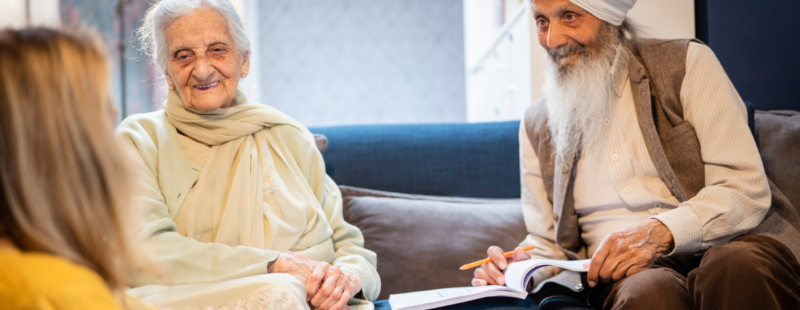Jessica Rees, Research Associate for the DELONELINESS project at King’s College London, discusses findings from a series of workshops across the UK with people from minoritised ethnic groups.
What does the word loneliness mean to you?
A feeling of emptiness inside your chest, the realisation that you are alone, missing that special someone, or feeling lonely in a crowd of people. This is the question we asked in the Connect and Cope workshops to begin a conversation and learn more about how loneliness is perceived by older adults from certain minoritised groups. Between June and July 2023, we engaged 46 people over the age of 65 across the UK in London (n=10), Manchester (n=16) and Sheffield (n=20) from South Asian, Chinese and Somali communities.
What did we find?
Loneliness was a common and familiar feelings which older adults recognised and had experience with across their lives.
- In some cultures, it was ‘not permissible’ or ‘allowed’ to live alone which led to fears of not being found after a fall or not having help if unwell. Such anxieties were reduced by the knowledge people from their local places of worship or community groups would contact them if they did not attend.
- Older adults discussed the importance of religion and spirituality in managing feelings of loneliness. For those following Hinduism, the practice of meditation developed a positive mindset and feelings of gratitude. For those following Islam, daily prayers provided a sense of purpose and routine with a feeling that someone is always with you when reading the Quran.
- Language proficiency was cited as a barrier to connection to the local community if older adults were unable to understand people in their neighbourhood. Older adults relied on family members for translation, a duty some thought should be recognised as a caring responsibility because of how disabling it can be not being able to speak English.
What did experts think?
In October 2023, we hosted a dissemination event to bring together researchers and third sector organisations interested in understanding and addressing loneliness in later life.
- Success of the workshops were reliant on trust which takes time to develop in community organisations supporting older adults. The workshop created a safe space and ‘a springboard effect’ encouraging older adults to open up about their feelings.
- Discussions highlighted the importance of community organisations in supporting older adults with a range of physical and mental health needs. Micro-organisations which help alleviate loneliness commonly have a lack of funding. Providing evidence for the long-term implications of these services would prove beneficial in securing funding.
- Policies towards loneliness needs to address the impact of structural aspects of loneliness for example, digital isolation created by reliance of technologies which creates additional stresses for those without English as a first language.
- Measures of loneliness cannot fully capture the unique experiences of loneliness when it is very subjective and fluctuates over time. It needs to be further developed in research to become more comprehensive.
- Suggestions to involve older adults in research from age 50+, may be more comprehensive because of the early development of health issues compared to white people.
Next steps
We will continue our collaboration with the organisations involved in the Connect and Cope workshops to ensure the voice of older adults from a variety of backgrounds is included in our research. Over the coming months, we will incorporate our understanding of the cultural differences in loneliness into development of a smart monitoring and communication system to detect feelings of loneliness in later life. If you are interested in hearing more about the EPSRC/NIHR funded DELONELINESS project, please contact the team: DELONELINESS@kcl.ac.uk
Acknowledgements
We would like to thank staff and members from the Wai Yin Society and Israac Centre for their support and engagement in the workshops. A special thank you to Madiha Sajid for co-developing workshop content and co-facilitating the London workshop. A thank you to all the students involved in supporting the workshops: Millie Evans, Chiara Francis, Anisha Ramjuttun, Emily Rees and Jo Orpin-Hatton. The Connect and Cope workshops were funded by a King’s College London Research Seed Funding Grant, and a University of Sussex Knowledge Exchange Policy Fellowship.





No comments on this article yet. Please feel free to submit a comment below.
By submitting a comment you grant Campaign to End Loneliness a perpetual license to reproduce your words and name/web site in attribution. Inappropriate and irrelevant comments will be removed at an admin's discretion. Your email is used for verification purposes only, it will never be shared.